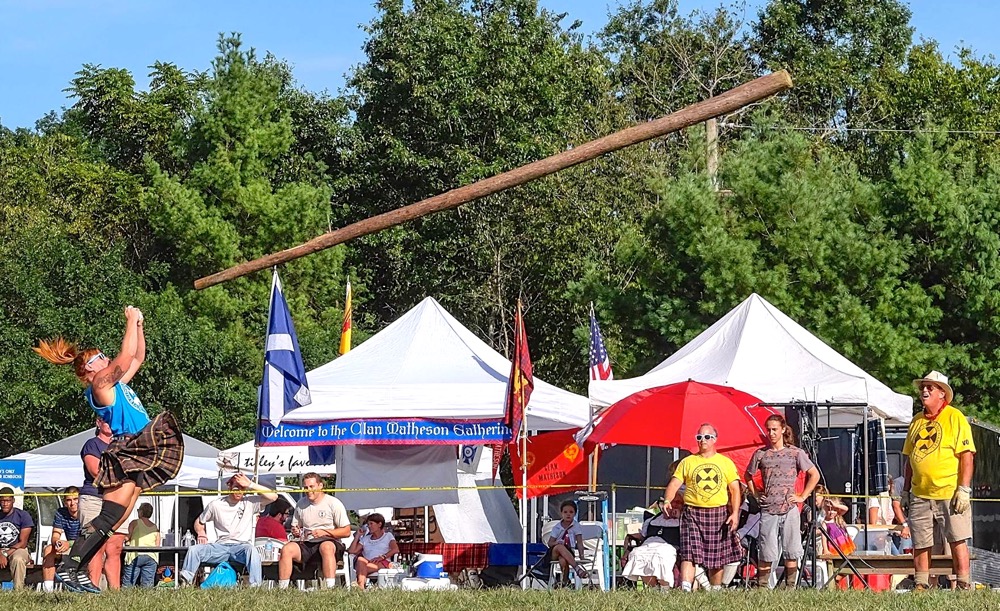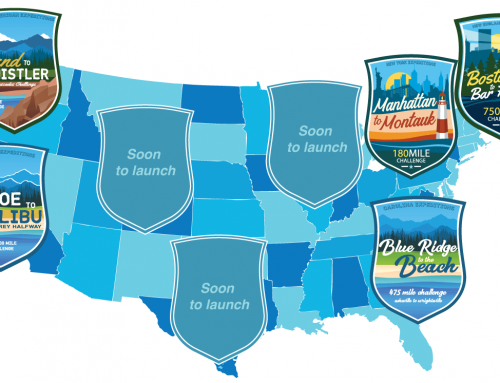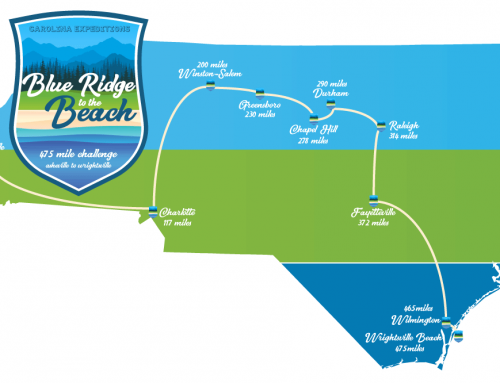The next Grandfather Mountain Highland Games are scheduled for July 2017. In addition to Scottish themed games and events, there are two big running events— the Grandfather Mountain Marathon and The Bear, a 5-mile run that includes a 2-mile stretch with over 1,000 feet of elevation gain. TO learn more about the Highland Games and these events, please visit http://www.gmhg.org.
You can follow Amanda Ford at https://www.facebook.com/amandafordhighlandgames/
By Joe Nuss
Marine Veteran Amanda Ford got a lot of press this summer after competing at the Highland Games at Grandfather Mountain. The Highland Games are part of a festival designed to carry on and promote the Scottish culture as well as foster interest in traditional Scottish dancing, piping, drumming, athletic achievement, music and Gaelic culture. While the games have been going on for more than 50 years, it’s only recently that women have been breaking down the barrier in the sport. More and more women, like Ford, have been competing and gaining attention in these male-dominated athletic events. This past summer, she won the women’s title at Grandfather Mountain by placing first in six of seven events. In the hammer throw and clachneart (similar to shot putting), Ford won by big margins. In the hammer throw, she threw a 14-pound hammer 87 feet, 9 inches. She tossed the clachneart (a nine-pound stone) 28 feet, 6 inches.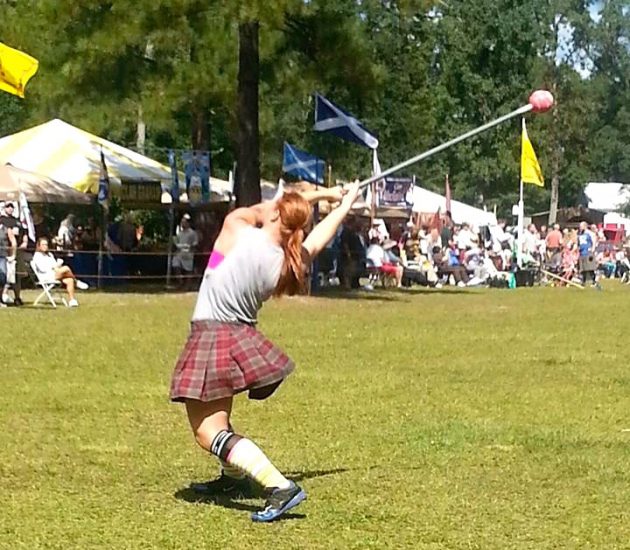
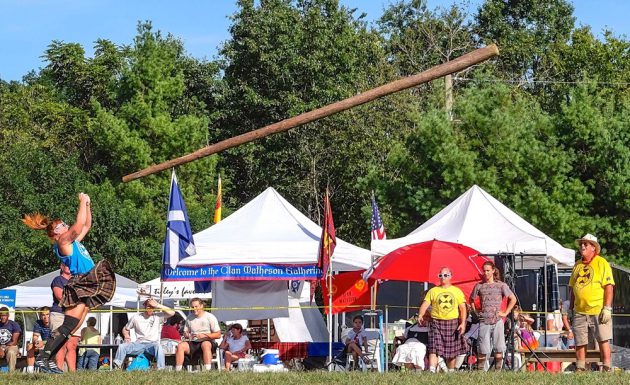 She was also the only woman to “turn the caber”, the most exciting of Scottish athletic events. Ford was the only one of eight contestants to flip the 18-foot, 110-pound telephone pole-like tree trunk. A perfect turn would be flipping the caber end over end to land directly away from the contestant, for example, tossing it entering a clock at 6 o’ clock and having the pole fall at 12 o’ clock. Ford’s caber landed at 1:30.
She was also the only woman to “turn the caber”, the most exciting of Scottish athletic events. Ford was the only one of eight contestants to flip the 18-foot, 110-pound telephone pole-like tree trunk. A perfect turn would be flipping the caber end over end to land directly away from the contestant, for example, tossing it entering a clock at 6 o’ clock and having the pole fall at 12 o’ clock. Ford’s caber landed at 1:30.
Ford fell in love with the sport a few years ago and is seeing its rewards in the number of young girls that she has inspired. While she is not the first woman to compete in Scottish games like these, she is helping popularize the sport for other women but, that’s nothing new. An elite athlete, Ford is also deployed to Iraq two times during her tour of duty from 2004 to 2008.
Inspired by 9/11, Ford knew she wanted to enlist in the military but, wasn’t sure what branch of service to join. It took a challenge from her uncle, a former Marine, to make up her mind. “My uncle said ‘you can’t hack it as Marine because you’re a girl’,” she says. “I was like ‘I’m a girl and I’m going to do it!’”
She was first assigned to the Operations unit at Marine Medium Helicopter Squadron 364 in Camp Pendleton, CA. The unit, known as the Purple Foxes, deployed to Al-Taqaddum, Iraq in 2005 during which time Ford was in charge of her section in operations. While she was always involved in sports growing up, it was here that Ford developed her commitment to exercise.
“We were just living out of little huts and tents and, of course, sand was everywhere and in everything you can think of. They had a little workout gym. It was in a tent. For out there, I guess it was a pretty nice gym,” says Ford. “You had your free weights, you had all your ellipticals. When we could get power, the treadmill would work.”
At first, Marine Corps training and physical conditioning was miserable for Ford. “I was forced to do it versus ‘this is a sport and I really love it and I want to do,’” she says. “So it was a little different mindset. I had to get used to grasping the concept of the reasoning why they did it.”
In addition, Ford was actually considered overweight at the time, even though she wasn’t. In the regimented and standardized world of the military, men and women had to fall within a specific height-to-weight ratio. Often times, more muscular individuals, like Ford, would fall outside the standard and have to diet or work out more to lose weight, though sometimes she could get a waiver based on a percent body fat measurement.
“Certain days out of the week you had to set a specific time aside where you had to go train with a different instructor. Basically, they worked you out even more just to lose weight. It never worked because their idea was run, run, run. My body was like, no, no, no! In addition, I didn’t really know proper eating habit at that time,” admits Ford. “I was young and I ate everything in sight and I was going to war.”
So, while deployed, Ford primarily worked on building endurance. “I was just mainly built for strength, I feel. So, in my free time I tried to work out as much as I could to build endurance in case I ever got in a situation where I had to run or exert myself in longer distance.”
During a second deployment to Iraq in 2006, Ford volunteered to be a door gunner, breaking into the traditionally male occupational speciality, as well as being the Chief of Operations. It was during that deployment that another helicopter in the squadron was shot down. The main pilot was also a female Marine and friend of Ford’s.
“Of course, it was a horrific event,” says Ford. “That happened in 2007 and I remember it as if it was yesterday. She was supposed to be my battle buddy and come home with me. That didn’t happen.”
After that second tour in Iraq, Ford decided not to re-enlist in 2008 when her contract was up. “I was going to stay in, but that last tour hit me hard,” she says. “I had to get out… I went twice and knowing me and my attitude with things as a Marine, I don’t know if I would have made it back safely.”
Ford admits to being a little bit unsure of what to do with her life after leaving the military. “Apparently, you can’t be a door gunner in the real world,” she laughs.
Eventually she went to go to school for a surgical technology in California. “It didn’t really work out at the time with what was going on in my life so, I decided just to switch everything up and move out to North Carolina with a buddy. I guess that was the post-deployment craziness PTSD kicking in. I was like, I’ve got to switch everything out. Let’s go to North Carolina. Once here, I decided to complete and finish what I went to school for even though I wasn’t sure of it.”
Ford finished her surgical technology degree at Miller-Motte College and worked a couple of different jobs until she was finally able to land a job at the Department of Veteran Affairs in Wilmington.
“I really, really wanted to work for the VA,” she says. “It’s my way of helping out. I’m a Vet. I want to help Vets. Ironically, after being out of the military— and it’s so hard to explain— but it’s so difficult to try to get along with non-military people for a while. I made my friends and whatnot, but I never felt comfortable until I came to the VA. I walked in the door and for the first time I started crying. You see all these Veterans. Most of our patients are older at first but, now we’re getting a lot of Operation Iraqi Freedom and Operation Enduring Freedom Veterans. It feels like home because you have that unspoken family.”
Ford knows that prevalence of horror stories about the VA across the country, too, but works hard to change that view. “I love my job here. I know personally as an employee, every one of us work our tails off to try to help as many people as we can regardless of hoops we have to jump through or things we have to do to get things done. We try our best.”
Athletically, Ford got more into fitness and started competing in body building shows after separating from the military. Eventually, she was introduced to the Scottish inspired sport by her fiancé, Chris Chafin, who is a professional athlete in the sport. While more and more women like Ford are being requested at games, but have not yet garnered professional status yet. “We’re still paying to go to our games,” says Ford. “A lot of us try to keep it going and just get our names out there.”
Ford’s success is largely due to her own hard work but, also acknowledges how being in the military has helped her. “As far as the Marine Corps teaching me discipline and commitment and stuff like that, that’s really helped now as an athlete for fitness.”


